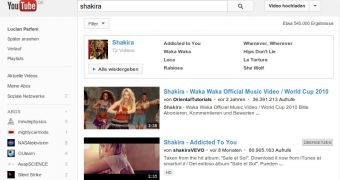Germans have the misfortune of living in a country where YouTube (basically) has no music. Maybe that's actually a good thing, on some level, making it possible for everything else on YouTube to thrive.
In any case, there's no chance of that changing anytime soon as talks between Google, which owns YouTube, and GEMA, the German music licensing group, broke down, once again.
Gema, like many other music licensing groups, is supposed to have the artists' interests in mind and get paid whenever the music it handles is played somewhere.
But like most of these groups, the artists are the ones getting hurt since they don't make any money and have their songs blocked.
But many of these groups aren't interested in the artists, they're interested in making money, money that more often than not doesn't even end up back with the artists, and to do that they need to squeeze everything they can.
The group asked YouTube to pay for the music video it hosts at a rate of 12 cents per stream. That's obviously unsustainable, on the verge of being ridiculous.
As a result, YouTube blocks all music videos in Germany, the ones covered by Gema at least. This has been going on for years with no end in sight.
While the two sides have been negotiating, talks are now dead. Gema is now considering other ways of getting YouTube to pay, particularly for the infringing videos uploaded by its users.
Gema also doesn't like the message German users see when trying to watch a music video claiming that it's misleading. The message says that the video in question is unavailable due to Gema's actions.
"YouTube believes that rights holders and artists should benefit from their work. We have dozens of collection society deals in place across more than 45 countries because we provide an important source of income for musicians and a platform where new artists can be discovered and promoted," Google responded to the situation.
"Music labels are generating hundreds of millions of dollars on YouTube every year. Artists, composers, authors, publishers, and record labels in Germany are missing this opportunity as a result of GEMA’s decisions," it added.
"We remain committed to finding a solution with GEMA compatible with YouTube’s business model so that we can again provide a source of revenue for musicians and a vibrant platform for music lovers in Germany," it said.

 14 DAY TRIAL //
14 DAY TRIAL //